| Srl | Item |
| 1 |
ID:
057957
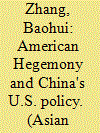

|
|
|
| 2 |
ID:
097380
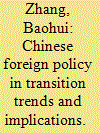

|
|
|
| 3 |
ID:
108795
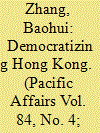

|
|
|
|
|
| Publication |
2011.
|
| Summary/Abstract |
The system of functional representation constitutes the greatest challenge to political reform in Hong Kong. Utilizing recent developments in institutional and ideational theories in political science, this article explores how both power and ideas shape the politics of reforming functional representation. The impasse generated by the current balance of power has given rise to a plethora of ideas that seek to reform the system while preserving its place in the political process. However, recent direct negotiations between Beijing and moderate democrats in Hong Kong have triggered a significant political realignment. This shift in the political balance of power has generated new scenarios for the reform of functional representation.
|
|
|
|
|
|
|
|
|
|
|
|
|
|
|
|
| 4 |
ID:
186729


|
|
|
|
|
| Summary/Abstract |
This study dispels the common view that the Trump administration has fundamentally reoriented the United States’ China policy by emphasizing strategic competition. Instead, the study argues that the Obama administration’s pivot initiative began the shift of the United States’ China policy from a defensive realist posture toward an offensive realist posture. The Biden administration’s China policy inherits the strategic competition approach. This study suggests that the competitive logic of the anarchic international system underlies all three administrations’ competition-oriented China policies. Therefore, while there are differences in the China policies of the three administrations, their commonalities and continuities are salient. Structural realism, especially offensive realism and dynamic neorealism, thus offers important insights into the future direction of Sino-US relations.
|
|
|
|
|
|
|
|
|
|
|
|
|
|
|
|
| 5 |
ID:
088392
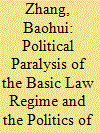

|
|
|
|
|
| Publication |
2009.
|
| Summary/Abstract |
The present constitutional system of Hong Kong is supposedly executive-led. In reality, it is a system of "disabled governance." This article uses recent institutional theories to reveal the weaknesses of the Basic Law regime. It contends that if Hong Kong democratizes under the Basic Law institutional framework, it will not be able to promote good and effective governance
|
|
|
|
|
|
|
|
|
|
|
|
|
|
|
|
| 6 |
ID:
104109


|
|
|
|
|
| Publication |
2011.
|
| Summary/Abstract |
The US - China military space relationship has been driven by the security dilemma in international relations. China pursues military space capabilities in part to counter in perceived national security threats posed by the US quest for space dominance and missile defence. However, the current strategic adjustment by the Obama administration and the altered situation at the Taiwan Strait have moderated the bilateral security dilemma, offering on opportunity for arms control in outer space
|
|
|
|
|
|
|
|
|
|
|
|
|
|
|
|
| 7 |
ID:
082374


|
|
|
|
|
| Publication |
2008.
|
| Summary/Abstract |
This article examines whether China may modify its no-first-use nuclear policy in the future. It suggests that due to the ascendance of Taiwan as the central security challenge for China and its inability to use conventional deterrence to prevent American military intervention in the Taiwan Strait, there are increasing Chinese discussions on the role of nuclear deterrence in this context. This article suggests that for political and strategic reasons China is unlikely to formally renounce the no-first-use policy. However, this does not rule out the possibility of China threatening first use of nuclear weapons when a real crisis in the strait makes American military intervention inevitable or imminent. Indeed, recent evidence suggests that some of China's nuclear experts are promoting a flexible approach to the no-first-use Policy. Thus, the article suggests the U.S. must prepare for the contingency of Chinese nuclear deterrence in the Taiwan Strait and examine how this scenario may impact American security strategies in the Pacific.
|
|
|
|
|
|
|
|
|
|
|
|
|
|
|
|
| 8 |
ID:
101933
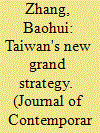

|
|
|
|
|
| Publication |
2011.
|
| Summary/Abstract |
Since Ma Ying-jeou assumed the presidency, Taiwan's relations with Mainland China have been profoundly transformed. This article uses the perspective of a grand strategy to interpret and explain Taiwan's new approach to cross-Strait relations. It suggests that Ma's government has adopted a grand strategy of accommodation that uses assurances, confidence building, and economic integration to enhance Taiwan's security. This new grand strategy has both ideational and materialist roots. The article also assesses the preliminary results of Taiwan's new security approach and its future sustainability.
|
|
|
|
|
|
|
|
|
|
|
|
|
|
|
|
| 9 |
ID:
105439


|
|
|
|
|
| Publication |
2011.
|
| Summary/Abstract |
This article examines the rising prominence of strategic nuclear deterrence in Sino-US relations. China is the only major nuclear power that has been actively expanding its offensive capabilities. Its nuclear modernization has inevitably caused concerns in the United States. The article suggests that China's nuclear programme is driven significantly by US missile defence, which has fundamentally altered the incentive structures for Chinese nuclear deterrence. The article also assesses the latest Chinese perception of US strategic adjustment under the Obama administration and its potential impact on arms control. It reveals that recent measures by the United States to restrain its missile defense could be conducive for achieving a strategic nuclear understanding between the two countries. The article then suggests a number of concrete actions for China and the United States to realize such an understanding.
|
|
|
|
|
|
|
|
|
|
|
|
|
|
|
|